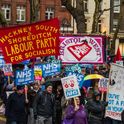Election 2017 is a choice between Theresa May’s buttoned-up, Brexit Conservatism and Jeremy Corbyn’s unshaven socialism. So the obvious thing to say about it is, of course, that it represents one almighty fork in the road. And when you look behind the leaders to the nuts and bolts of the policy programmes that they are putting forward, there is a great deal of truth in that.
Instead of the £10bn or £12bn differences in tax and spend plans, which has often been all there is to choose between the parties in the other elections that I can recall, Corbyn’s Labour is putting forward tax rises and spending pledges to match of more like £49bn, so roughly four times as much. Should Corbyn win, there would be an immediate and sharp rise in corporation tax, a reversal to planned steep cuts in school spending, and an entirely different approach to the economy, incorporating a significant public investment programme and even renationalisation of some of the utilities. Should the Tories win, by contrast, a hard Brexit and much harder immigration caps could very soon have grave implications for the economy and the Exchequer.
And yet. Listening to the Institute for Fiscal Studies crunch the two manifestos this morning, what struck me more than the undoubted differences between the rival visions for Britain was the shared problems that the next government will face whoever wins. This was not only because the Institute was equally sniffy about the two documents—although it certainly was that, mocking Labour’s failure to grapple with how much tax dodging its revenue raisers will run into, and ridiculing too the Conservative’s insistence that public services can muddle through with an impossibly tight squeeze. No, what really jumped out was just how many hideous problems the next administration is going to have to face, whatever its political stripe.
Consider, for example, the debt and the deficit. George Osborne originally vowed he’d have it all under control, with the nation’s overdraft eliminated by 2015, but the long pay-back period after the crash is now set to drag on to 2025 even under the Tories (and ever so slightly longer under Labour), which will mean we will have had a full 15 years of austerity with the Conservatives, triple the mere five hard years originally suggested.
Consider, next, the prospects for poverty. So many benefit cuts that Osborne put in the pipeline are still due to come through that the poor are set to get very much poorer, losing approaching 10 per cent of their meagre incomes under the existing plans over the next few years. Corbyn’s Labour is opposing austerity in a much fuller-throated way than Ed Miliband ever dared to do, promising to reverse several of the specific measures. But—even so—because he has not explained how he would avoid the more general freezes and restrictions that save the most cash, his plans would only succeed in reducing this hit on the poor to about 7 per cent.
Then there is the health service. The Tories are committed to a trivial increase in spending, Labour to an extra several billion—which certainly sounds like real money. And yet when you stand back from the heat of the election campaign and take the long view, you can see that neither is proposing anything remotely sufficient to restore the path of expenditure to anything like the 4 per cent annual growth which the service has on average received since its inception. Judged against that benchmark, the question is whether you want a £40bn-odd shortfall with the Tories, of a £30bn-plus gap with Labour.
It is a fateful election, in other words, but listening to the number crunchers one question stirs in the mind. Is it an election you would want to win?
Things can only get bitter: no matter who wins in June, there'll be problems
Election 2017 is the most important for a generation—or so we are told. Actually, poor Britons are set for a brutal squeeze whoever triumphs next month
May 26, 2017

Photo: Isbael Infantes/EMPICS Entertainment











